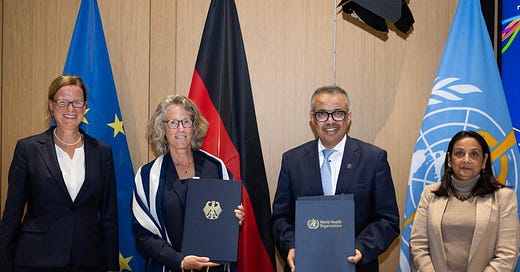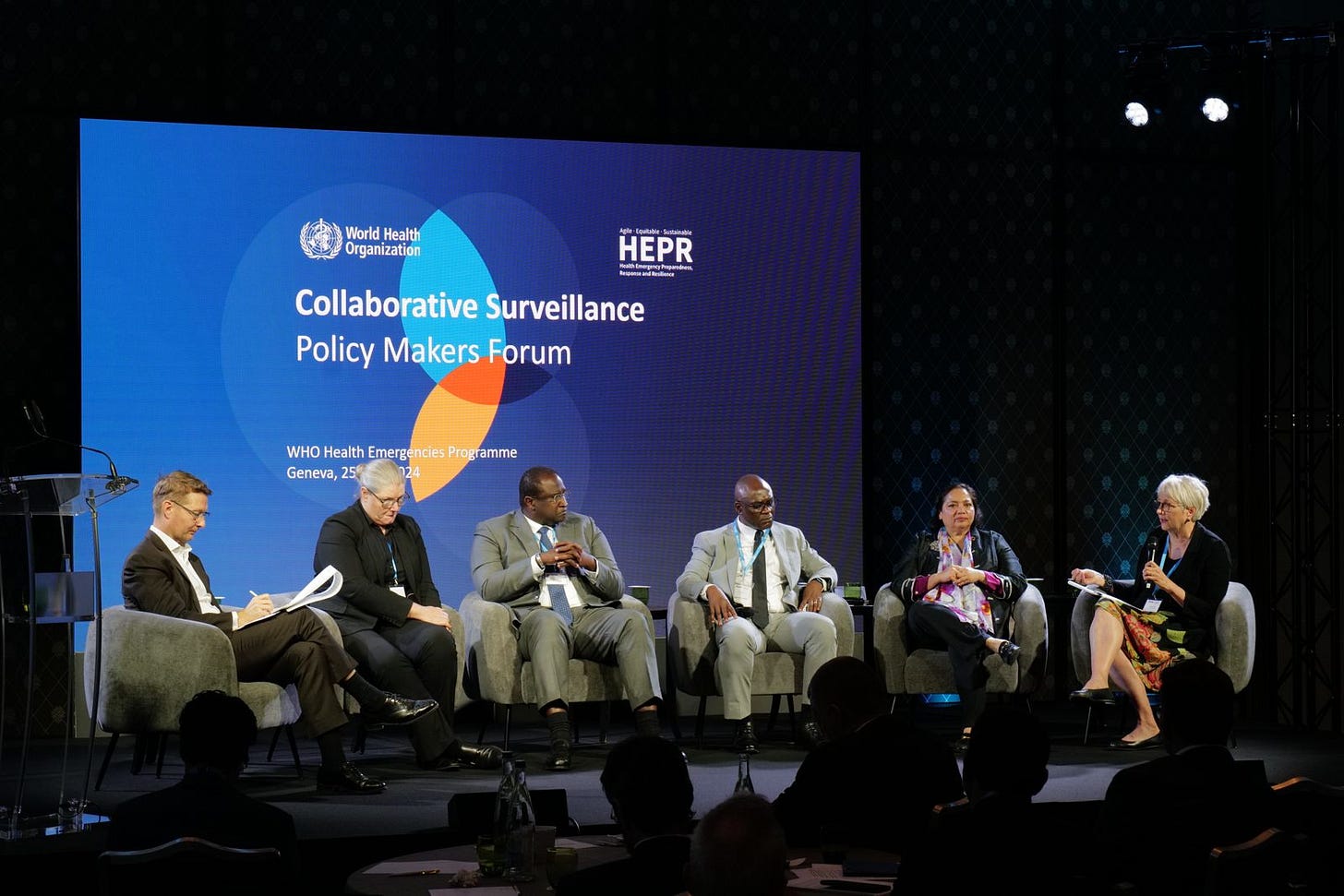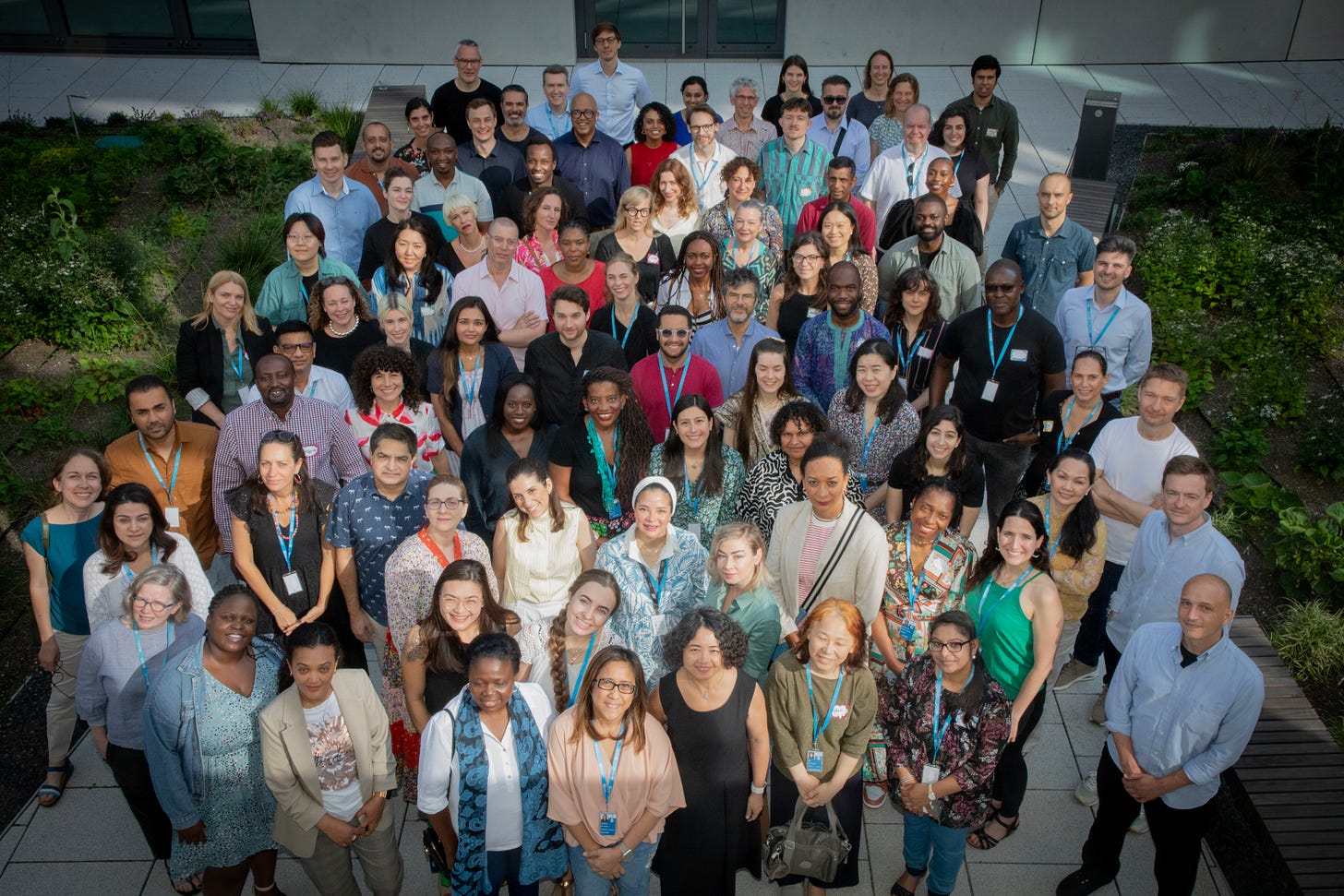Three years on: Reflections from the WHO Hub for Pandemic and Epidemic Intelligence
By Dr Chikwe Ihekweazu, Assistant Director-General, WHO
Three years ago today, on 1 September 2021, with the support of the Government of the Federal Republic of Germany, we established the WHO Hub for Pandemic and Epidemic Intelligence. This launch was in response to the urgent need to strengthen how the world approaches public health intelligence and decision-making in the wake of the COVID-19 pandemic. Our mission is to support countries to generate better data and use advanced analytics to make better decisions to prevent and prepare for future health emergencies.
As I reflect on our journey, the world is faced with the second mpox outbreak of international concern in just two years. This crisis underscores the importance of our mission to strengthen preparedness and respond quickly to emerging and re-emerging health threats. As a key part of the WHO Health Emergencies Programme, the Hub is committed to building stronger connections and communities and enhancing the capacities in our Member States required to detect, monitor, and respond swiftly to mpox and other public health threats. While events trigger action, our engagement is a long game.
Seat Agreement between the Federal Republic of Germany and the WHO Hub for Pandemic and Epidemic Intelligence on 28 September 2023 © WHO
Much of our efforts have been centered around the establishment of Collaborative Surveillance as a guiding principle for health emergency preparedness and response. We have highlighted the need to systematically strengthen surveillance capacity and collaboration among stakeholders across regions and sectors. Launched at the 76th World Health Assembly in May 2023, Collaborative Surveillance is now a core element of WHO’s framework to strengthen the global architecture for health emergency prevention, preparedness, response and resilience.
Over the past year, we have been actively implementing Collaborative Surveillance through a diverse portfolio of strategies, activities, and targeted projects with our Member States and partners. Our goal is to reinforce Collaborative Surveillance as a framework that mobilises resources and political commitment towards disease surveillance and epidemic intelligence capabilities, thereby facilitating evidence-based decision-making at the country, regional, and global levels. Our efforts have shown promising results, including better alignment among WHO Regional Offices, Member States, key philanthropies, and global funding instruments such as the Pandemic Fund. The European Union has integrated Collaborative Surveillance as a guiding principle in its new global health strategy. These are significant steps toward ensuring a more coherent global approach to detecting and understanding infectious disease threats.
Collaborative Surveillance Policy Makers Forum, May 2024, 77th World Health Assembly © WHO/ Gregory Maillot
With Collaborative Surveillance as our guiding principle, the Hub’s work is built upon solid partnerships with our Member States and partners. Strong National Public Health Agencies (NPHAs) are essential to health emergency preparedness and response. Therefore, we are dedicated to supporting and strengthening the resilience of NPHAs. These NPHAs are the cornerstone for Collaborative Surveillance, providing a platform to build and strengthen public health intelligence. However, achieving equitable and lasting change requires more than just capacity building and includes the proactive accelerating of collaboration among Member States. Our vision is to create a safer future with interconnected NPHAs for local, regional and global health security.
As part of efforts to strengthen global security, the WHO Hub launched the Health Security Partnership to Strengthen Surveillance in Africa initiative with Africa CDC, WHO AFRO, WHO EMRO, the Robert Koch Institute in Germany and Global Affairs Canada. Since its launch in July 2023, this initiative has coordinated efforts to strengthen national capacities in disease surveillance, epidemic intelligence, and biosecurity through adapted technical guidelines, targeted training, and national contingency strategies across six pilot countries.
Through the International Pathogen Surveillance Network (IPSN), we are enhancing global collaboration to detect and understand viruses and their mutations rapidly. Since its launch in May 2023, IPSN has quickly grown to include 200 partners across 71 countries. The IPSN’s Country Scale-up Accelerator supports countries by creating global goods, while our established Communities of Practice tackle common challenges and develop innovative solutions in areas such as wastewater surveillance. A $4 million Catalytic Grant Fund from philanthropic donors is now available to support pilot projects in low- and middle-income countries, reinforcing our commitment to prioritise genomic surveillance on the global health agenda.
Another key network which has grown significantly throughout the last year is the Epidemic Intelligence from Open Sources (EIOS). This platform supports Member States to enhance early detection capabilities by connecting global experts to utilise publicly available data for swift, evidence-based action. Expanded through the Hub, EIOS has tripled its user base since 2020 and now serves 94 Member States as of August 2024, with more countries expected to join with the release of EIOS 2.0 at the end of this year.
Collaboratory Summit © WHO
A key element in strengthening preparedness for health emergencies is unifying disease modelling and data science globally. The COVID-19 pandemic highlighted the fragmentation within expert modelling communities. We are building networks through the Hub’s Collaboratory initiative to facilitate faster, more comprehensive data analysis for emerging disease threats. Our secure and inclusive digital platform fosters collaboration among epidemiological modellers and data scientists on various diseases and topics. During the 2022-23 (link) and the ongoing mpox outbreak, the Collaboratory has worked closely with other WHO colleagues and external experts to support data collection and analysis, helping to inform appropriate action.
At the cutting edge of pandemic and epidemic intelligence, we are also developing a Decision-Support Pandemic Simulator to bridge the gap between epidemiological insights and policy interventions. The Pandemic Simulator will allow for real-world simulations of public health interventions during emergencies, providing a clear understanding of their effectiveness in mitigating outbreaks. We have created a conceptual blueprint with a consortium of partners and aim to launch a prototype by the end of 2025.
There are several other significant initiatives aimed at strengthening epidemic and pandemic intelligence. These efforts include establishing common standards in disease surveillance, providing guidance for researchers in pandemic and epidemic intelligence, training field epidemiologists with a One Health approach, enhancing Contact Tracing practices, and supporting Member States in improving their risk analysis capacities. Our Open Source Programme Office is also helping public health practitioners leverage open-source technologies to improve access to digital solutions for health emergency preparedness and response. Reflecting on these achievements over the past three years, I am incredibly proud of our diverse team's dedication and expertise in driving these efforts forward.
Our team at this year’s retreat in June 2024 – © WHO/Alfonso Moral
None of this would have been possible without our strong connections with Member States and partners worldwide. We deeply value our collaborators who work with us to find the most effective solutions to our shared global public health challenges. My sincere thanks go to the Federal Government of Germany for their vision and unwavering support, to Director-General Dr Tedros Ghebreyesus and Deputy Director-General and WHO Health Emergencies Executive Director Dr Mike Ryan for their visionary leadership, and to our colleagues across WHO’s Health Emergencies Programme, WHO Regional and Country Offices for their invaluable collaboration.
Since my reflections on last year’s anniversary, our global challenges have grown more complex. Climate change continues to exacerbate health risks, antimicrobial resistance is straining health systems, and we are witnessing an unprecedented zoonotic outbreak of avian influenza. Tragically, major armed conflicts are jeopardising the health of entire populations, requiring coordinated efforts to protect health systems and mitigate infectious disease outbreaks. These challenges demand collaborative monitoring, a swift and coordinated response, and the dedication of the global community.
In the face of these growing challenges, the WHO Hub stands resolute in its mission. Our commitment to fostering trust, building partnerships, and driving innovation remains stronger than ever. By working together, we can address these emerging threats and protect global health. The stakes are high, but so is our determination to build a safer, healthier world for all.







